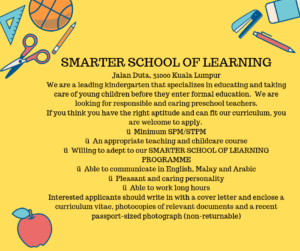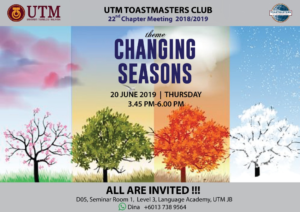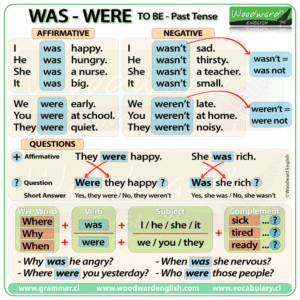I taught form 1, form 4 and form 6 (MUET) classes when I did my LI. For the lower form, for the obvious reason, they assigned me to the classes with many students who got C range grades either based on their UPSR (for form 1) or PT3 (for form 4). I took it as a challenge because even though some of them got better grades, their English proficiency is still can be improved.
I do admit that I struggled a bit to get myself familiar with the syllabuses and whatsnot. So I have to search for the DSKP, SOW and stuff even though my colleagues give whatever things that I need EXCEPT activity worksheet. I believe in personalised lesson plan and activity. Even though we might teach the same subject/course, yet we should custom-made our teaching because we are different and our students are also different. Of course, this would entail extra efforts on our parts as teachers. So, some might use short-cuts of using the same worksheet for different classes taught by different teachers. “Sharing is caring“.
Even though I share the activity worksheet with others, yet I created my own after searching and looking at examples from the internet. Sometimes, I took an excerpt from a book that I was reading and turned it into a reading comprehension exercise. Normally, the available exercises would be abridged from the original source so using this approach, I need to abridge the excerpt as well. This would hone my writing skills as I realise that I “abandon” writing any journal during this period of LI. Yup. I decided to totally immerse myself in the process of being a teacher. As a teacher, you rarely involve in writing journals or whatsnot for publication unless you are doing your post graduate study. When I did my LI, I notice that none of the teachers ever published their action research. The irony is some of them don’t even know what action research is. After investigating the factors of this phenomenon, I conclude that they are bogged down by many administrative stuff and teaching. So, before you know it, a year passes by without doing any research about and on your teaching i.e. action research.
I religiously collected some data since I decided to use token economy for my form 4 class (majority of them rarely submitted any homework that I gave – especially the boys. The girls were different. They submitted their homework on time. No problem). I will write more about how I did the token economy in different post.
How to encourage students to submit their work?
First, you need to know how they complete their homework. There are so many reasons how and why they submit their homework on time. A common assumption is they do the homework themselves because they could complete the task that I give. But there are also students who would submit their homework and yet they complete the homework due to plagiarism. Yup, they would copy each other homework without understanding how to complete the task. In addition, there are also students who have difficulty to complete any homework that I give because they do not understand the topic or in writing composition, they do not know how to construct sentences. In this case, there might be students who will not submit the homework at all because of he/she does not know how to do the homework and there are also another group of students who would still submit their homework and yet, they might submit incomplete homework. On top of that, there are also students who do not have the “tool” to write. Meaning, they do not have any pen to write and thus, they are not able to complete my homework.
Looking at this variety of reasons how and why students submit (or don’t submit) their homework, as a teacher, we need to use different strategy and approach to deal with these variety of issues even though it might lead to these two things i.e. submission or no submission of homework. It is really unfair for a teacher to punish a student who did not submit his/her homework when he/she does not have a pen to write with. It is almost unthinkable at this age that there are students who do not have this basic stationery, a pen. Yet, this is the reality. There are students who could not afford to buy a pen. Given a choice of buying a RM2 worth of meal and RM2 pen, some might choose to buy a meal than a pen. Hey, you can’t blame them. According to Maslow’s hierarchy of needs, the lowest basic needs are related to physiological needs. Yup. You need to eat and drink in order to survive (Alhamdulillah the air that we use to breathe is free).
In addition, it is also unfair for students to be punished if they are not able to complete their homework due to lack of understanding even though they have given their best effort to complete any given task. For example, if a student is only able to complete less than 350 words essay, we need to look closely at several aspects. If they have already use all of the points which have been discussed/given, this means that they are not able to elaborate the points in more than one sentence. What should we do? Rather than punishing them for incomplete essay, we have to acknowledge their effort (and hidden struggle). But at the same time, we need to give constructive comments. There is an incident in which a student does not able to complete his homework because his pen has run out of ink. Yup. This relates to the first point. No pen = incomplete homework.
However, if they copy each other work, we could not let this matter go without any action. We need to do something about it. In this case before we make any decision (i.e. punishment), we need to identify why they copy other’s work. Most probably, they might also have lack of understanding to elaborate points. But in this case, rather than giving their best shots to complete the task, they use the short-cuts way i.e. copy each other work. This is a classic example of mini plagiarism. Students should be punished if they copy each other work. Individual effort should be applauded and encouraged.
That’s why sometimes I give students “group essay”. Meaning, they have to discuss the points in groups and write their essay in mahjung paper later on. We can divide the essay into several paragraphs. So, each group would be assigned to one paragraph of at least 50 words. So, if I have 6 groups of students (one group = 4 members), I would have 6 paragraphs which equivalent of 300 words. So, in any continuous essay, since it is required for them to write 350 words, I wrote the first introductory paragraph of 50 words (of course, I asked each group to provide on sentence) on the white board. Later on, ask the students to continue writing the following paragraphs in their own group. In this case, students don’t feel pressured to complete the whole task on their own. But, you need to monitor closely when they complete their group work. To encourage group cohesion, you need to give reward if they could complete the task as a group. This would lead to the second point.
Second, reinforce desirable behaviours. Use rewards, praises etc. to make your students feel appreciated and valued. To be continued….





